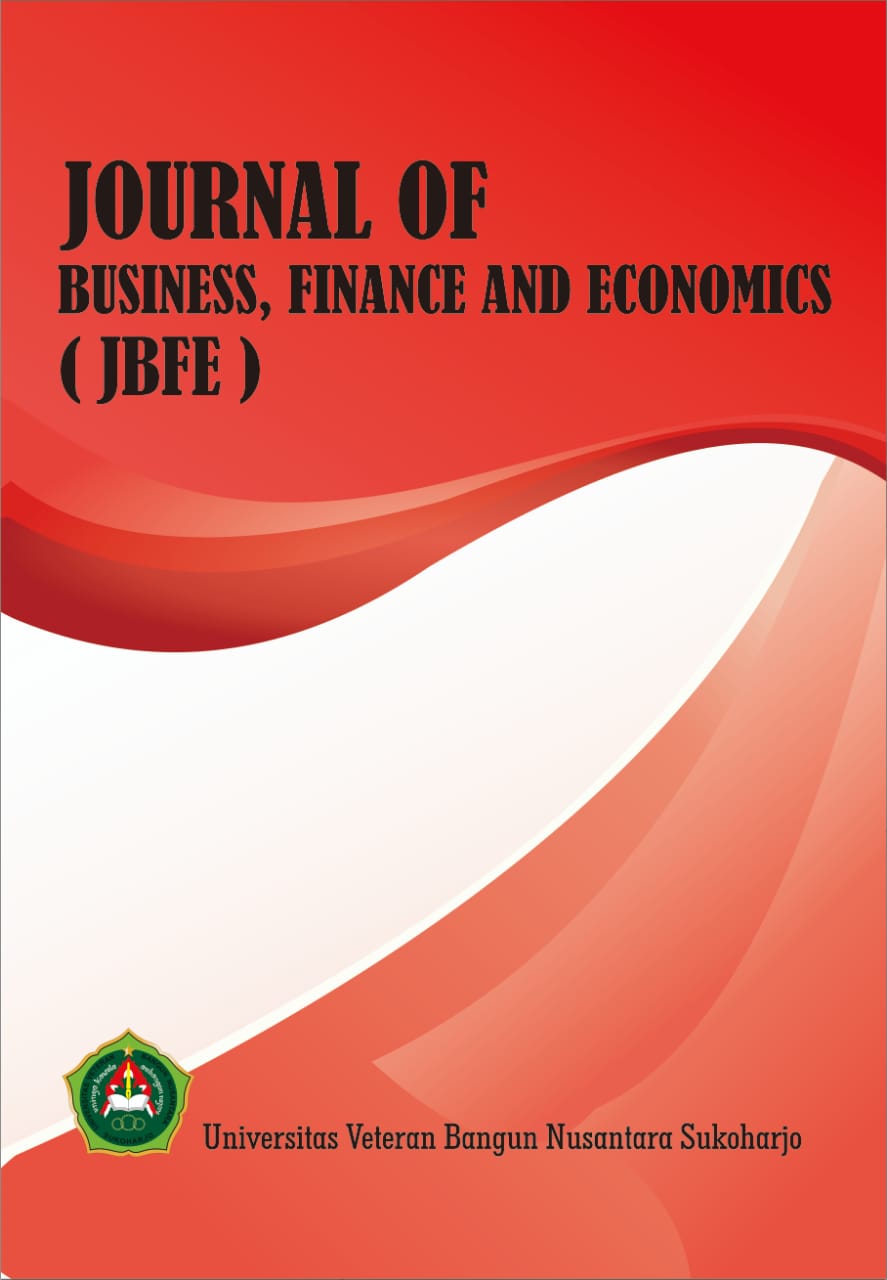Pengaruh Pengetahuan Akuntansi, Tingkat Pendidikan, Motivasi Kerja, dan Pengalaman Kerja terhadap Kemampuan Membuat Laporan Keuangan UMKM Berdasarkan SAK EMKM di Kota Medan
DOI:
https://doi.org/10.32585/jbfe.v6i1.6557Keywords:
The influence of accounting knowledge, education level, work motivation, UMKM based on SAK EMKMAbstract
This research aims to determine and analyze the influence of Accounting Knowledge, Education Level, Work Motivation, and Work Experience on the Preparation of Financial Statements for UMKM. Based on SAK EMKM, this is because there are still many UMKM entrepreneurs in Medan City who have not yet prepared financial statements in accordance with the SAK EMKM standards. This research is a type of quantitative research. In the data collection required for this research, a research questionnaire was used, which was distributed to UMKM traders. All the respondents in this study are micro-business operators in the city of Medan. This study uses purposive sampling technique as the sampling method. The total sample used amounted to 95 micro enterprises. The data analysis technique used in this study is multiple linear regression analysis with the aid of SPSS software. The results of the analysis from this study indicate that the variables of Accounting Experience and Work Experience have a positive and significant impact on the preparation of financial statements based on SAK EMKM, while the Level of Education and Work Motivation do not have a positive impact.
Downloads
References
Ahmad, M., & Dwi Yandari, A. (2024). Pengaruh Tingkat Pendidikan, Pengalaman Usaha, Skala Usaha, Literasi Keuangan, Sosialisasi Sak Emkm Terhadap Penyusunan Laporan Keuangan Berdasarkan Sak Emkm (Studi Kasus Umkm Di Kabupaten Sumenep).
Dewi, N. P. L. K., & Putra, I. P. D. S. (2022). Pengaruh Etika Kepemimpinan, Fungsi
Badan Pengawas dan Pengalam Kerja Terhadap Kualitas laporan Keuangan. Hita Akuntansi Dan Keuangan, 3(2), 68–72. https://doi.org/10.32795/hak.v3i2.2376
Guthrie, J. P. (1977). Pengaruh Disiplin Kerja, Motivasi Kerja dan Gaya Kepemimpinan Terhadap Kinerja Karyawan. Can. J. Chem, 55, 3562–3574.
Kessek, G., Kewo, C. L., & Tangkau, J. (2024). Pengaruh Pemahaman Informasi Akuntansi Keuangan, Tingkat Pendidikan, Pengalaman Kerja Terhadap Laporan Keuangan Umkm Berdasarkan Sak Emkm. Jurnal Ekonomi, Kependidikan, Manajemen, Dan Akuntansi, 2(2), 1–14.
Maulida, F., Tiurma, T., Sipahutar, U., Terminanto, A., Indonesia, U. P., & Pancasila, U. (2023). PENGARUH TINGKAT PENDIDIKAN , LATAR BELAKANG PENDIDIKAN , LAMA USAHA TERHADAP KUALITAS LAPORAN KEUANGAN UMKM DI KOTA MEDAN : AUDIT LAPORAN KEUANGAN SEBAGAI VARIABEL. 80–89.
Maghfiroh, L., Askandar, N. S., & Junaidi. (2022). Pengaruh Tingkat Pendidikan, Pengalaman Kerja, dan Pemanfaatan Sistem Informasi Akuntansi Terhadap Kualitas
Laporan Keuangan Pada Pemerintah Desa Se-Kecamatan Purwosari. E-Jra, 11(09), 84–
Malindar, B., Sairmaly, F. A., Nifanngeljau, J., & Laratman, P. (2023). Pengaruh
Pengetahuan Akuntansi, Sosialisasi Standar Akuntansi Dan Skala Bisnis T erhadap Kualitas Laporan Keuangan Emkm. Jurnal Akuntansi Trisakti, 10(1),
–168. https://doi.org/10.25105/jat.v10i1.15230
Nadhiroh, A. F., & Putri, E. (2025). Pengaruh Kompetensi Sumber Daya Manusia , Pengetahuan Akuntansi , Tingkat Pendidikan , Motivasi Kerja , Dan Pengalaman Kerja Terhadap Pembuatan Laporan Keuangan Umkm Di Kecamatan Tambakromo Kabupaten Pati. 6(2), 795–814.
Novia, O., & Sujana, E. (2021). Pengaruh Profesionalisme, Kompetensi, dan Pengalaman
Kerja Terhadap Kualitas Laporan Keuangan Badan Usaha Milik Desa di Kecamatan Sawan. Jurnal Akuntansi Profesi, 12(2), 341. https://doi.org/10.23887/jap.v12i2.35780
Nurwanto, N., Dewi, R. R., & Masitoh, E. (2022). Pengaruh Pendidikan, Pemahaman
Akuntansi, dan Pengalaman Kerja terhadap Penyusunan Laporan Keuangan. Owner, 6(1), 1093–1100. https://doi.org/10.33395/owner.v6i1.693
Sari, P. M. (2023). Kualitas Laporan Keuangan Umkm Berbasis Sak Emkm : Self Efficacy
Periska, V., Yanti., SE.,M.Ak, & Rachpriliani., SE.,M.Ak, A. (2024). Pengaruh Tingkat Pendidikan, Pemahaman Akuntansi, dan Kesiapan Pelaku UMKM Terhadap Penerapan SAK EMKM Dalam Penyusunan Laporan Keuangan UMKM. El-Mal: Jurnal Kajian Ekonomi & Bisnis Islam, 5(3), 1666–1680.
Sulistyawati, S. A. (2020). Pengaruh Tingkat Pendidikan, Latar Belakang, Pemberian
Informasi dan Sosialisasi terhadap Pemahaman UMKM Dalam Menyusun Laporan Keuangan Berdasarkan SAK EMKM (Studi Kasus Pada Usaha Kecil Kabupaten Tegal). Universitas Panca Sakti. Tegal, 154.
YUSRIWARTI, Y., & SUSANTI, N. (2022). Pengaruh Penerapan Standar Akuntansi
Pemerintahan Berbasis Akrual, Sistem Pengendalian Intern Dan Motivasi Kerja Terhadap Kualitas Laporan Keuangan Daerah (Studi Kasus Pada Organisasi Perangkat Daerah Kab. Inhil). Jurnal Akuntansi Dan Keuangan, 11(1), 34–44. https://doi.org/10.32520/jak.v11i1.2018
Zerlina, A., Silfi, A., & Hariyani, E. (2023). Pengaruh Sosialisasi, Tingkat
Pendidikan,Persepsi Pelaku Usaha, Pemahaman Akuntansi Dan Motivasi Kerja Terhadap Penerapan Penyusunan Laporan Keuangan Emkm. Jurnal Kajian Akuntansi Dan Auditing, 18(1), 32–48. https://doi.org/10.37301/jkaa.v18i1.102
Downloads
Published
How to Cite
Issue
Section
License
Copyright (c) 2025 Journal of Business, Finance, and Economics (JBFE)

This work is licensed under a Creative Commons Attribution-ShareAlike 4.0 International License.
Authors who publish with the Journal Of Business, Finance, and Economics (JBFE) agree to the following terms:
- Authors retain copyright and grant the journal the right of first publication with the work simultaneously licensed under a Creative Commons Attribution License (CC BY-SA 4.0) that allows others to share the work with an acknowledgment of the work's authorship and initial publication in this journal.
- Authors are able to enter into separate, additional contractual arrangements for the non-exclusive distribution of the journal's published version of the work (e.g., post it to an institutional repository or publish it in a book), with an acknowledgment of its initial publication in this journal.
- Authors are permitted and encouraged to post their work online (e.g., in institutional repositories or on their website) prior to and during the submission process, as it can lead to productive exchanges, as well as earlier and greater citation of published work.














